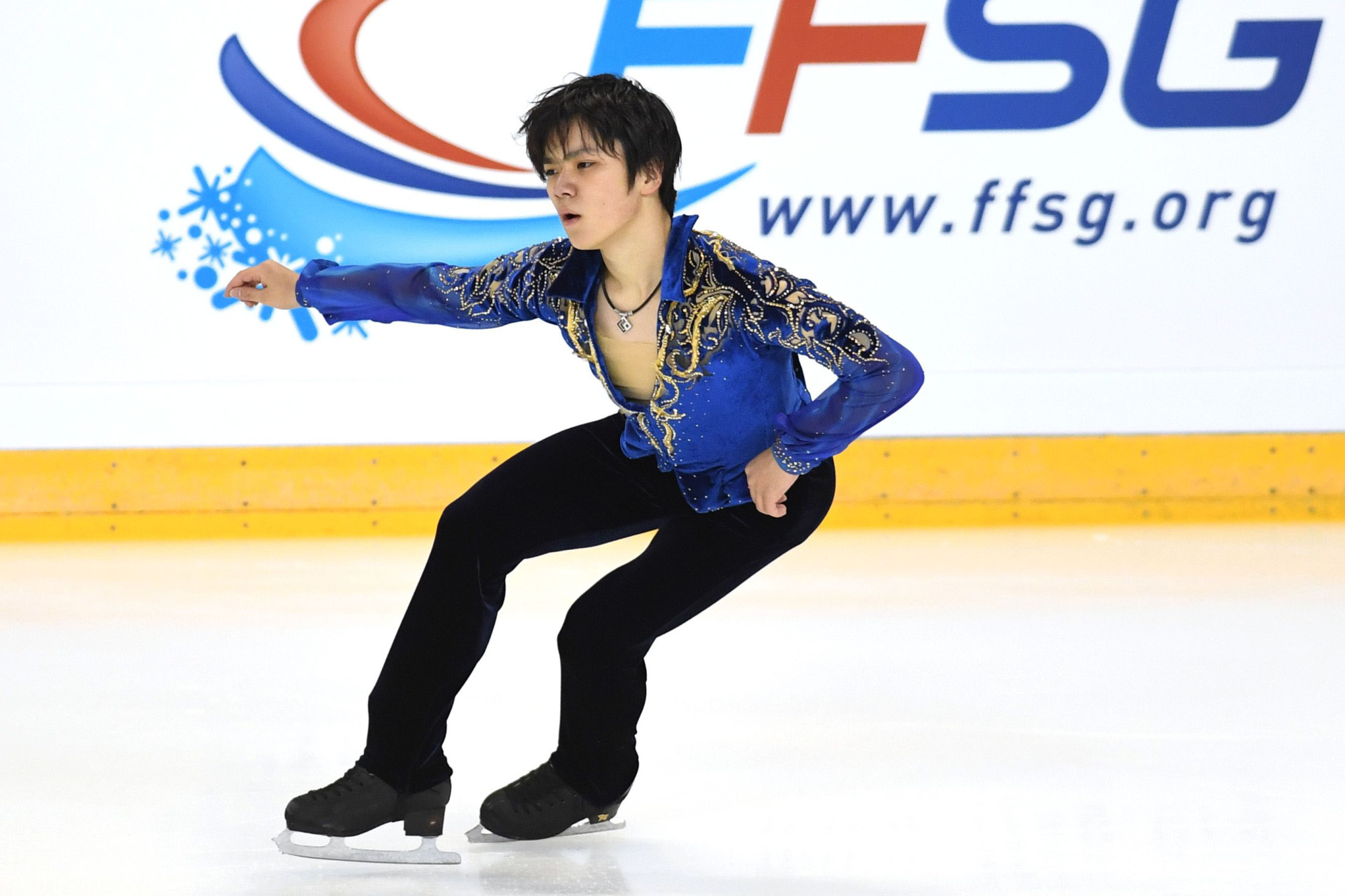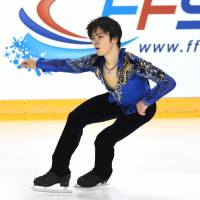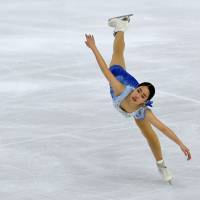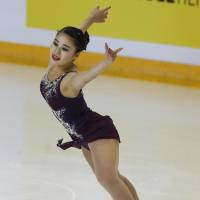Shoma Uno qualified for the Grand Prix Final for the third straight season with an uneven performance at the Internationaux de France in Grenoble on Saturday. Uno uncharacteristically fell in both the short program and free skate on the way to finishing second behind Javier Fernandez.
The fact that Uno still strolled into next month's GP Final despite the miscues shows just how much the bar has been raised for the 19-year-old. He is in every conversation now when talk of who will win the gold medal at the Pyeongchang Olympics comes up and deservedly so.
The Nagoya native has taken home the bronze medal at the GP Final the past two seasons, but will go into this year's contest as the favorite at the event held in his hometown. As with last season's Japan nationals, the path has been partially cleared by the absence of the injured Yuzuru Hanyu.
Having won Skate Canada and finishing second in France, Uno joins Russia's Mikhail Kolyada as the first two men's qualifiers for the GP Final.
"It was really tough for me, but compared to the short program I felt better," Uno was quoted as saying by the ISU website after his free skate on Saturday. "I guess I can motivate myself and practice more and more for the upcoming competitions. Since it (the final) is in my hometown, a lot of people are expecting a lot from me, but my main goal is to do my own skating."
Uno, who had missed training time recently while suffering from the flu, was far behind Fernandez in the short program after falling on his opening quadruple flip to "Winter."
Eurosport's Mark Hanretty had some interesting observations on Uno's jumping style after the short program.
"He doesn't have the greatest fundamental flip technique," Hanretty stated. "The takeoff is debatable because he pre-rotates so much."
Hanretty cited Uno's triple axel from a spread eagle for praise.
"The entry to this is ridiculously difficult," Hanretty noted. "His maturity and performance defy his age."
The Olympic Channel's Tracy Wilson was impressed by Uno's ability to bounce back from a fall on the quad flip and land a superb quad toe loop/triple toe loop combination jump.
"Shoma is just so fluid and so terrific at making everything look effortless and like it's done with ease," Wilson commented.
"(Being the) world silver medalist makes him an automatic podium contender and a challenger for the gold (in Pyeongchang)."
Uno ended up losing to Fernandez by more than 10 points (283.71 to 273.32) despite winning the free skate and that caught Hanretty off guard.
"Wow. The second mark they really gave it to Javier," Hanretty said. "Have to say I'm a little surprised. I thought it was going to be close. In the end it wasn't as close as I thought."
Uno fell twice during his free skate (on a quad toe loop and a triple flip) to "Turandot" and this prompted questions from the analysts about the conditions in Grenoble.
"There was a lot of talk at this competition about the ice conditions not being very good," CBC's Carol Lane stated. "Apparently it was very brittle. There was some talk about water being mixed with white powder to give it a glossy surface.
"It was a very error-prone competition. You have to wonder, were conditions optimum or not?"
Olympic Channel announcer Steve Schlanger noted Uno's fortitude in his free skate.
"You see the talent, the ability and the aggression," Schlanger commented. "The will to go for it."
Four-time world champion Kurt Browning was effusive in his evaluation of Uno's free skate.
"He's a little pocket rocket. He attacks every note of the music," Browning said. "He has a smoothness in his jumping style that allows him to rotate very quickly in the air.
"The outside of his left shoulder open which allows him a little more time — a fraction of a second more time — to adjust those landings.
"There's that landing position where he lands sort of facing out to the left. He doesn't land facing the direction he came from. It's just the way he works."
Browning made a point of noting how during his competitive career the condition of the ice could unnerve him.
"If I was competing on brittle, hard ice, my confidence level just eroded away," he recalled.
Lane believes Uno's flexibility is a big key to his success.
"His knees just absorb the landing," she stated. "Often times when you think it is not going to work, it does just because of that."
Mihara misses GP Final
Mai Mihara was a disappointing fourth for the second GP this season and saw her chance at making the GP Final disappear. Considered one of the favorites to make Japan's two-woman team for Pyeongchang, Mihara could not rise to the occasion.
Russia's Alina Zagitova, the world junior champion, vaulted from fourth after the short program to win with a strong free skate. Zagitova's compatriot Maria Sotskova was second, with Canada's Kaetlyn Osmond rounding out the podium.
Mihara needed to win the event to make the GP Final, which against the stacked field in France was going to be difficult. Despite the result, she and Wakaba Higuchi remain the front runners to make the Olympic team.
Mihara, who was fifth at the world championships last season, had a strange beginning in her short program to "Libertango," under-rotating the back end of her opening triple lutz/triple toe loop combo and brushing up against the boards.
The analysts noted that Mihara was almost devoid of emotion in her short program and were unsure of why this was the case.
"Odd that she miscalculated the distance between her and the barrier," Hanretty commented.
"Such a sweet young lady. The program itself is choreographed very, very well . . . she didn't seem to emote to the tango," Hanretty continued.
Wilson also recognized the lack of emotion from Mihara.
"Really looking subdued compared to her usual," Wilson said. "What I noticed right away again is her subdued expression. Normally sparkles. She's a little bit like a kid, happy to be out there. That was missing today. . . . Not on her game."
Schlanger identified the contradiction in Mihara's performance.
"One of the biggest things she worked on over the summer was her expression, her sense of presence. . . . That was one of the things that was noticeably absent," he stated.
Despite the absence of emotion from Mihara in the short program, Wilson did highlight the 18-year-old's smoothness.
"She has a nice lilting knee. Works with the ice very well," she said. "It is very much a give and take. It can't be all work. There is a such a giveback from the ice if you are open and accept it. That translates into a flow and ease and speed across the ice."
Though she was fifth in the free skate, Mihara still earned noteworthy reviews from the experts for her effort to "Gabriel's Oboe."
"This is a kid you can count on. She lacks the maturity artistically yet shows tremendous patience throughout the performance," Wilson commented. "You can see that she is really hearing and feeling the music. Artistically her skating in between the jumps is not at the level of some of the skaters that you will see.
"She still needs work on her upper body and her backline and the detail of her arms, but at 18, in only her second season, that is just the next step in the process."
Browning anticipates a bright future for Mihara.
"Her jumping style is so calm and steady," he said. "When the whole program becomes one entity, this young lady is going to be just gorgeous to watch."
Lane liked what she saw from the Kobe native in the free skate.
"Her jump landings are absolutely squeaky clean. She doesn't leave you in any doubt," Lane noted.
"I love her. She doesn't perhaps have the power of an Osmond, in the speed and flow of the jumps, but the cleanliness and the beautiful air positions, just fabulous."
Shiraiwa's coming out party
The Japanese skater who received the most plaudits in Grenoble was Yuna Shiraiwa, who was third after the short program before placing sixth in the final standings.
Just a week after making her senior debut at the NHK Trophy in Osaka, Shiraiwa jetted to France and competed again. She did it with style and flair.
Her short program to "The Girl with the Flaxen Hair" was absolutely sublime. Ice Time recognized the potential in Shiraiwa when he first saw her as a junior a few seasons back.
Like many observers, Eurosport's Simon Reed was blown away by what he witnessed from the Kyoto native.
"The maturity of the performance. How strong she is at 15, it seems unreal," Reed commented. "The strength in that core and those legs is phenomenal.
"I think we are going to see an awful lot more of Yuna Shiraiwa."
Shiraiwa fell on her final jump (a triple loop) at the very end of her free skate to "Pictures at an Exhibition," which was a pity, but made an impact nonetheless.
"A natural ease across the ice. She calls herself a real technical skater and is trying to bring emotion to her program," Wilson said. "I would say she has done a really good job of that."
Skate America up next
Three-time national champion Satoko Miyahara and last season's Japan junior champion Kaori Sakamoto will represent Japan at Skate America this week in the final regular GP of the season in Lake Placid, New York.
Though Miyahara and Sakamoto are out of the running for the GP Final, they can help teammate Higuchi qualify by finishing with high placements in a field that will include Russia's Polina Tsurskaya and Americans Karen Chen and Ashley Wagner, who all are still in contention.
Takahito Mura will be the Hinomaru's lone representative in men's singles in a lineup that will boast U.S. champion Nathan Chen and China's Jin Boyang.
Junior titles on the line
The Japan Junior Championships will be held later this week at the Gunma Ice Arena in Maebashi. Ice Time will be on the scene to cover all the action as the new junior champions are crowned.
Despite the departure of Sakamoto, Marin Honda and Shiraiwa to the senior ranks, competition amongst the women's field should be especially intense. Rika Kihira, Mako Yamashita, Nana Araki, Riko Takino, Akari Matsuoka and Moa Iwano are all scheduled to take part.






















With your current subscription plan you can comment on stories. However, before writing your first comment, please create a display name in the Profile section of your subscriber account page.